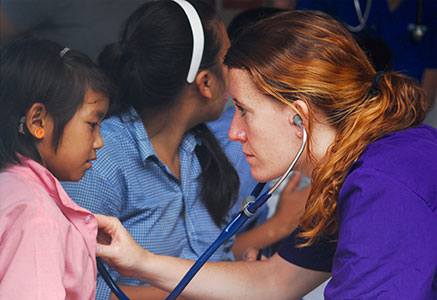
Einstein Global Health Fellowship participant examines a child in Himalayas (India).
Ten years ago I was working with some friends on a joint project at the Central Nairobi YMCA. In a park on the outskirts of town one afternoon, I watched as a group of kids from a nearby orphanage—dressed up in party clothes—came into the area with a group of non-Kenyan sponsors. The well-meaning adults had their arms around some of the children and were clearly trying to show them a fun time. All seemed well, but what I will never forget is the look of fear and discomfort on the faces of the children. The sponsors were clearly “voluntourists”—vacationers working on behalf of “good causes.” Their intentions might have been good, but I could tell from the children’s faces that they felt completely uncomfortable.
My experience in Kenya played a major factor in my decision to work in the global-health field. At Albert Einstein College of Medicine’s Global Health Center, I was pleased to meet medical students passionate about the field. Later, as director of the Global Health Fellowship program (through which some 100 medical students participate in global-health projects each year), I came to see how important cultural humility is to the overall student global-health experience.
Cultural humility, as I once heard noted medical anthropologist Dr. Paul Farmer say at a conference, is recognizing that one cannot even think about being culturally competent until one has lived in a place for about 20 years. It is a continual process that, in the context of health professionals, can be defined as becoming aware of how people’s cultures can affect health behaviors. Physicians can in turn use this awareness to cultivate sensitive approaches in treating patients. All of this requires self-reflection and self-critique. Students need to consider possible power imbalances when cultural differences between doctors and patients may have an impact on patients’ clinical outcomes.
When I send students abroad for global-health experiences in low-income countries, they—without exception—return with a revised, more empathic and culturally humble way of relating to their patients, and, for example, are more accepting of traditional health concepts and medicines.
At home and away
Preparation and post-trip conversations are the keys to success in these experiences. The Global Health Fellowship encompasses a number of events, from predeparture training to individual meetings with students upon their return. The initial training includes, among other topics, an interactive session about ethical issues to be considered during the fellowship, cultural humility and how to behave when working in another culture. The overarching message we convey to our students is “Do not do there what you cannot do here.” They understand that this is a precept set in stone.
When the students return, we discuss what they’ve learned. Increasingly often, students have mentioned seeing things that have made them uncomfortable following their experience in clinics working with underserved patients. For example, they’ve encountered unsupervised students treating patients, been offered opportunities to perform procedures that they are absolutely not qualified to do and learned of projects that are not sustained after their departure.
A couple of years ago, a student asked if there was an organization responsible for overseeing these programs where she could report events that bothered her, or practices she considered unethical. I reached out to my counterparts. The answer was no; a number of institutions and organizations had developed guidelines, but there wasn’t any single group responsible for oversight.
Improving program ethics
Now, two years later, we are about to host a conference at Einstein where one of the sessions will focus on the ethics of offering students short-term experiences in global health (STEGH). Conference participants will organize to choose from among the many guidelines that have been created, and develop an assessment and reporting tool for students and faculty.
We plan to produce a white paper whose results will be widely distributed, and will also work with the Consortium of Universities for Global Health, the largest such organization, of which most global-health centers are members, to help with the distribution and adoption of the results. We hope this will lead to a more ethical, productive and balanced experience for the students and for our partners in the host countries.
Currently, almost two-thirds of matriculating medical students expect to participate in a STEGH during medical school. The Association of American Medical Colleges’ 2013 survey of graduating U.S. medical school students found that 30.2 percent had participated in global-health experiences, an increase of nearly 25 percent since the first graduation questionnaire was administered in 1978. The VolunTourism Institute predicts a figure of 20 million STEGHs by 2020.
With the rising number of global-health students and tourists poised to travel, learn, and help—all with good intentions—it is increasingly important to have widely accepted and followed guidelines for operation of these programs. The tools produced at our upcoming conference will, I hope, become a model for equitable and sustainable projects to be followed by academic and tourist institutions alike.

